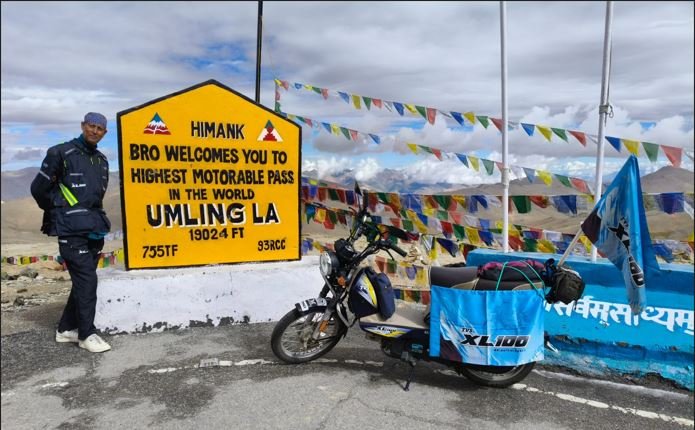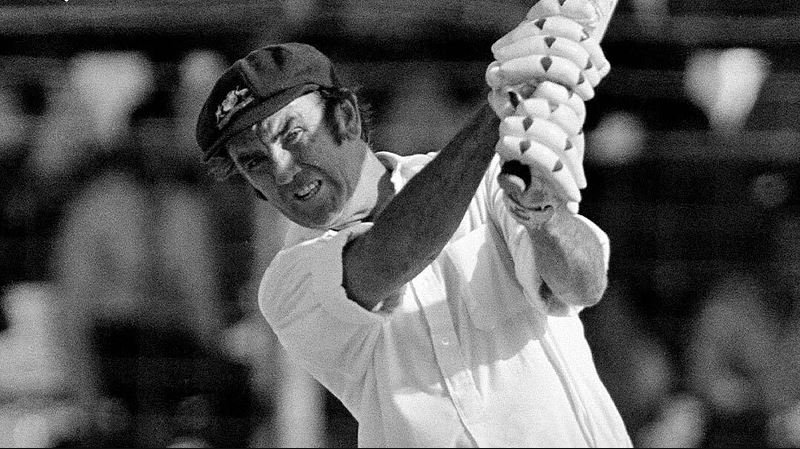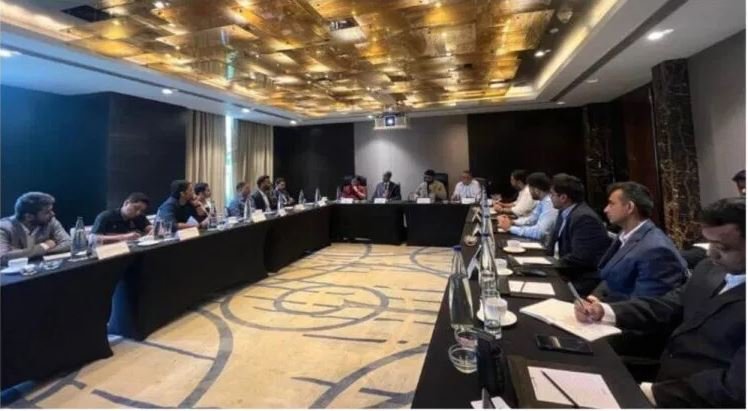Veteran two-wheeler driver becomes the first man to conquer the highest motorable roads in India on a moped

Veteran motorcyclist and Guinness World Record holder Subrata Boral has become the first Indian rider to conquer the highest motorable passes in the country on a moped, the TVS XL 100. This is the first example of the highest motorable passes being reached on a 100cc two-wheeler. Boral has recently completed the feat and returned to Kolkata. Boral achieved this incredible feat without any back-up. In the process, the highest motorable roads that he reached were Umling La (19,024 ft), which incidentally is the highest motorable road in the world. Among the other highest motorable roads that he conquered were Marsimik La (18,313 ft), Chang La (17,586 ft), Khardung La (17,582 ft), Norbu La (17,132 ft), Rezang La (16,420 ft), Tsaga La (15,260 ft), Sapi La (14,426 ft), Photu La (13,479 ft), and Namik La (12,139 ft). He travelled on the TVS XL 100 for 2,758 kilometers in total in a journey that started on 15th July and lasted 21 days. The veteran 55-year-old rider started his expedition from the Khyber Himalayan Resort in Gulmarg, Jammu & Kashmir. Boral’s expedition was blessed by the Federation of Motor Sports Clubs of India (FMSCI) with the heartfelt support of its President Arindam Ghosh. The latter not only encouraged Boral’s journey but also extended help to generate sponsorship from TVS & VM (Vamsy Merla).
Allan Border remembers his ‘sergeant major’ after his demise on Saturday

Former Australian captain Allan Border hailed former captain and coach Bob Simpson as the “sergeant major and a disciplinarian”, which allowed him to do what he did best. Simpson passed away at the age of 89 in Sydney, according to a report by Cricket Australia (CA) on Saturday. Speaking to News Corp, as quoted by SEN Cricket, Border, who he coached for the majority of his international career, the high points of which were the 1987 World Cup and the 1989 Ashes series win in England said, “Behind the scenes, he was the sergeant major and disciplinarian, and that allowed me to do what I did best.” “Occasionally, I would blow up, but it never lasted for long. I suppose we were a bit of an odd couple, but it just sort of worked,” he added. Border recalled spending time playing golf with his coach and also spending time with Ian Chappell, who did not get along with Bob. “So I found myself in the middle of that one, constantly defending Simmo to Ian. I am not sure I got that far! Simmo was the perfect man for the time. He was not everyone’s best mate, but that was not his role. Everyone who played under him, whether they liked him or not, would accept that they were better players for his influence. He was as good as any coach we have ever had. He had a fantastic cricket brain,” he concluded. Simpson was a key figure in Australia’s rise to the top of the cricketing world in the 1990s, and his impact lasted long after he left as a head coach in 1996. Simpson became the full-time coach for the Aussies when the Allan Border-led side was facing a massive decline in fortunes and was in the middle of a winless run that stretched out for three years, as per cricket.com.au. It was the Simpson-Border duo that instilled their mindset in the upcoming crop of Aussie stars such as Steve Waugh, David Boon, Dean Jones, and Craig McDermott. Simpson’s commitment to training as a coach, in batting and in fielding, helped the Aussies eventually mark a turnaround and become one of the best sides in the game. According to Border, one of the biggest highlights of Simpson’s coaching tenure was winning the 1987 Cricket World Cup hosted by India and Pakistan, defeating arch-rivals England in a closely contested final by seven runs at the Eden Gardens. During his playing career from 1957 to 1978, he represented Australia in 62 Tests, scoring 4,869 runs at an average of 46.81, with 10 centuries and 27 fifties in 111 innings and a best score of 311. He also took 71 wickets with the best figures of 5/57. He led Australia in 39 Tests, winning 12, losing 12, and drawing 15. He also played two ODIs, scoring 36 runs and taking two wickets.
ISL clubs blame AIFF for not highlighting the Supreme Court about the ‘depth of crisis’

Indian Super League (ISL) clubs have pointed out four immediate and severe consequences that have surfaced due to the ongoing uncertainty while formally requesting the All Indian Football Federation (AIFF) to approach the Supreme Court immediately. At a virtual legal counsel meeting on Friday, it was reported that it was agreed that the AIFF would verbally mention to the Court on Monday (18th August), raising the hardships faced by stakeholders of the ecosystem. The clubs said that the progress they have made over the past 11 years to build youth development systems and training infrastructure is now in ‘imminent danger of collapse’. Multiple clubs have suspended operations and terminated contracts of players and staff. The FIFPRO has simultaneously termed the clubs’ recent decision to stop salaries and terminate contracts unfair and also urged FIFA to look into it. The situation is so grave that the clubs said a risk has emerged where they clubs may be forced to shut down. Its impact on national team readiness, regulatory and international sanctions, and erosion of stakeholders’ confidence will be naturally worse. “More than two thousand direct livelihoods — players, coaches, medical staff, analysts, kit managers, groundsmen, administrative staff— hang in the balance, alongside countless indirect livelihoods dependent on the league,” they said. “This is a huge financial blow that clubs will not recover from this year, and it will affect the payout of salaries to players and staff in the immediate future, besides making several stakeholders contemplate a complete and permanent shutdown of their respective clubs.” At a meeting on 7th August, the AIFF had proposed to stage the Super Cup in September during the time the Supreme Court delivers a verdict on the matter, but the clubs remained unconvinced about it without clarity on the status of the start date of the ISL, which usually takes place in a September-April window. “Footballers depend almost entirely on regular club training and matches to maintain match fitness and tactical sharpness. Without a functioning league, our national team will be severely disadvantaged in upcoming AFC and FIFA tournaments,” it was pointed out. The AIFF was reminded that the Asian Football Confederation (AFC) mandates a minimum number of competitive matches (24) for participation in continental competitions. “Without the ISL, this requirement cannot be met, putting India at risk of suspension from all AFC and FIFA tournaments. FIFPRO, the global players’ union, has already apprised FIFA of the situation, increasing the likelihood of external scrutiny and possible sanctions,” the clubs said.





